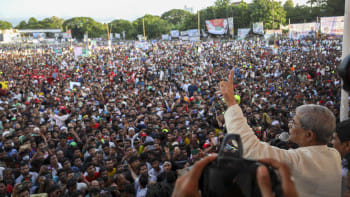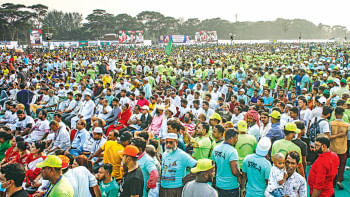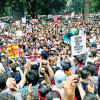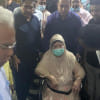AL's counter-programmes reveal its own insecurities

In a democracy, it is important for a political party to tolerate and respect other parties. When we see that the ruling Awami League lacks such qualities, it becomes evident that Bangladesh's oldest political party is going through a critical phase. One might wonder why I am saying "critical" when the party has been in power for the third consecutive term.
When the BNP started holding divisional rallies protesting against the hike in prices of fuel and daily essentials, the murder of its leaders, and demanding the release of Khaleda Zia, the party received a warm response at the grassroots level. Then, the ruling party showed up with counter programmes. Consequently, tensions intensified, verging on panic. Although ruling party leaders claimed that the BNP took to the streets with the intention of committing arson and violence, the rallies were found to be largely peaceful. The ruling party's apprehension, however, could not be brushed aside because of the BNP's role in widespread violence and arson preceding the 2014 elections, for which it was roundly criticised at home and abroad. But this time, the BNP seemed desperate to shake off that stigma by holding peaceful rallies.
Unfortunately, whenever the BNP announced a programme, the AL countered it with their own. Announcing counter programmes on the same day as the BNP, and often at a venue close to the BNP's, raises the possibility of tension at best and outright violence at worst. The phenomenon remains commonplace till date.
Although the BNP repeatedly asked the Awami League not to announce counter programmes, the ruling party did not listen. But when Awami League general secretary Obaidul Quader requested the BNP to withdraw its mass procession scheduled on December 24 in Dhaka, the BNP did defer it to December 30. Where are such good gestures from the ruling party?
Awami League and its leading front organisations said they announced the counter programmes for the sake of public safety and to resist the "terror and anarchy of BNP." One wonders, if the ruling party men must take to the streets to ensure public safety, what is the role of the government, administration, or law enforcement agencies?
Such statements from party leaders not only go against the rule of law but also betray a lack of confidence in the very government they currently run. Does the ruling party think that responsible wings of the government are not capable of ensuring public safety or reining in the BNP (should it turn violent)?
Holding rallies and processions is a constitutional right of a political party. But countering a political event with another, and thus potentially impinging on it, is not. The ruling party can take to the streets with its own political programmes. But when it announces counter programmes, what it demonstrates is nothing short of political bankruptcy.
The party has been in office for around 14 years now and has done substantial development work which has benefited the people. As such, it should be confident about itself. But a knee-jerk reaction in the form of counter-programmes in response to street mobilisations by the opposition is hardly demonstrative of any confidence it may have.
So why does the ruling party still feel compelled to employ such tactics? There could be several reasons. First, the ruling party takes to the streets to send the message that the opposition will never enjoy a walkover. Second, the counter programme announcements boost the morale of the party's rank and file, which is perhaps necessary at AL's grassroots, as BNP rallies themselves have been hugely successful in that respect. Third, and most dangerous, is that they believe a counter-programme would be an effective tool to obstruct and hinder the BNP's programme. Whenever two major political parties announce programmes on the same day and in nearby areas, it creates panic among the people, and leads to more suffering on the streets. Inconveniencing the people in this manner should be unacceptable, but the ruling party pays little heed to such "trivialities."
As the next general election is just a year away, we know that the political parties will take to the streets more often and campaign harder to get their respective messages across. The ruling party will beat its drums, harping on its development activities. The opposition will campaign against the misrule and misdeeds of the AL-led government.
So far, it must be admitted, the BNP has acted mostly maturely. We expect that the party that has been in office for 14 years will learn to reciprocate. If the AL fails to do so, it will be the one to pay the price. Today's voters are more politically conscious and unlikely to repeat past mistakes come elections.
The ruling Awami League appears to be in a bind. Neither does it have the confidence to be gracious to an all but annihilated opposition camp that refuses to collapse, nor can it be confident of a recurrence of either of the previous two elections (held in 2014 and 2018).
Mohammad Al-Masum Molla is chief reporter at The Daily Star.

 For all latest news, follow The Daily Star's Google News channel.
For all latest news, follow The Daily Star's Google News channel. 










Comments